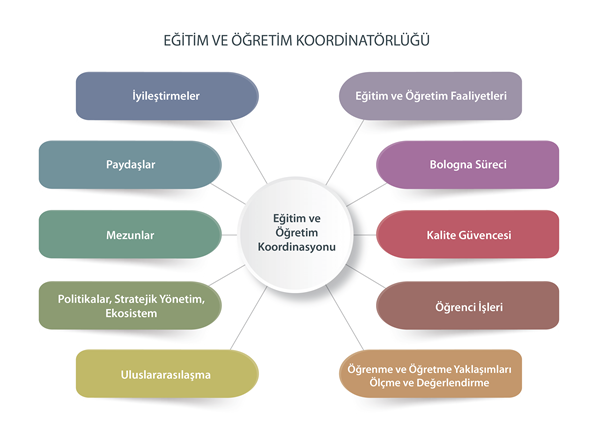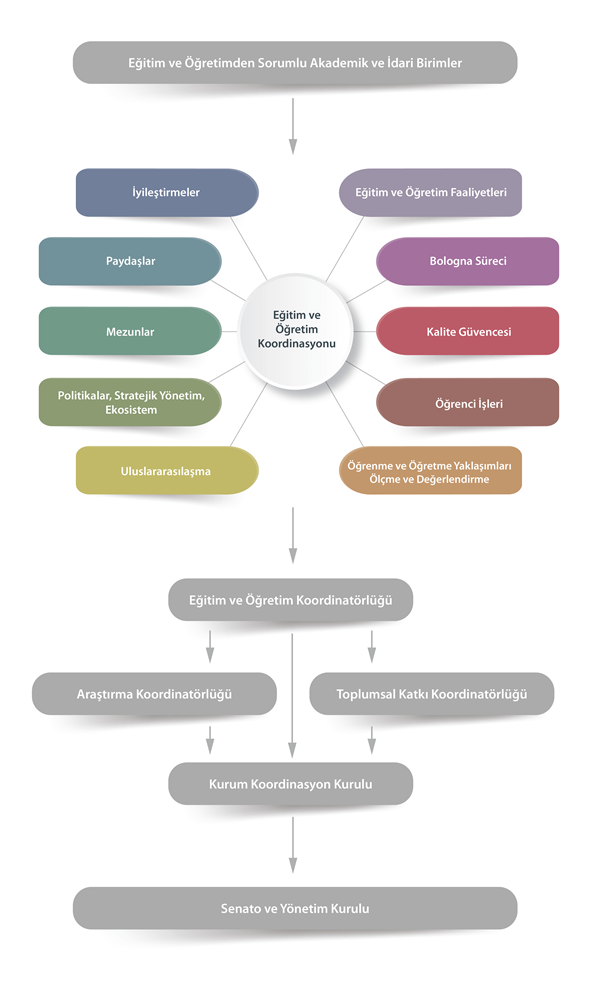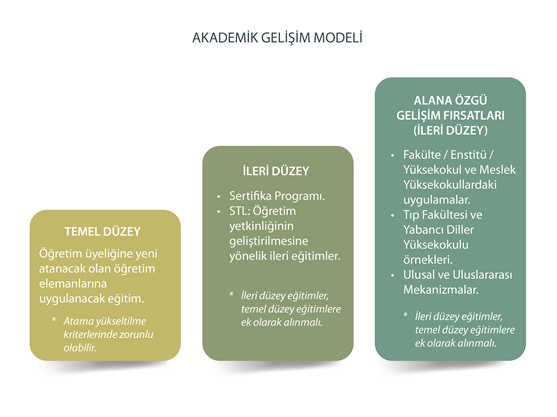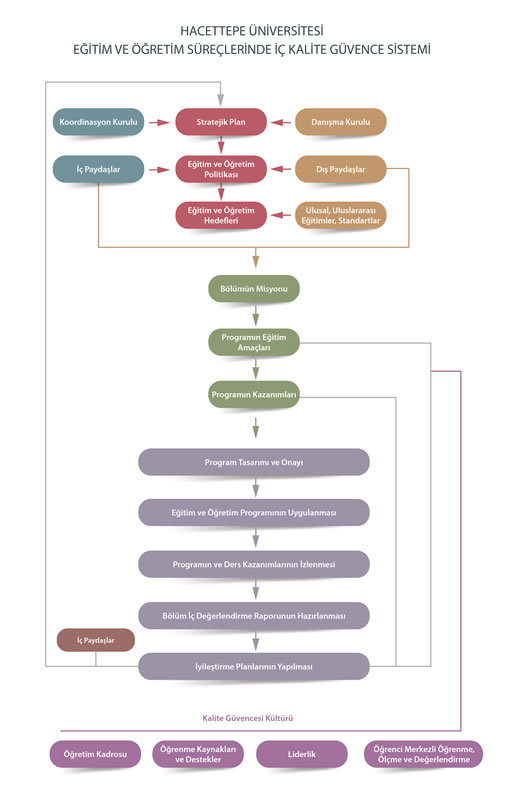Education and Training Coordination Office
Hacettepe University is determined to carry out its education and training activities in accordance with the educational goals and objectives and the educational policies determined in accordance with the strategic plan. It plans its education and training activities taking into account global trends, developments, evidence-based research and national goals and implements them with an integrated management system. It is important that the cycle of planning, implementation, monitoring and evaluation and improvement is systematically implemented in education and training processes.
Click for the coordination unit website.
Education and Training Management
Hacettepe University Education and Training Coordination Office
In order to carry out education and training activities with a systematic process management in 2023, the Education and Training Coordinatorship was established by the decision dated 03.08.2023 and numbered 118. The directive prepared to regulate the establishment of the Coordinatorship, its powers, duties and responsibilities, as well as its working procedures and principles, was updated by the Senate decision dated 25.01.2024 and numbered 17 (Appendix 1).
Coordination of education and training activities
Education and training activities are coordinated by assessing the ecosystem dynamics in education and training processes, preparing future projections, executing in line with institutional policies and strategic goals/objectives for education and training, and promoting cooperation between units to implement the improvements identified through internal and external evaluations (Figure 1).

Figure 1. Coordination of Education and Training
Organisational Structure of the Coordination Office for Education and Training
The Education and Training Coordination Office is headed by the Rector, a Vice-Rector (responsible for education and training) (Vice-President) appointed by the Rector, a representative of HÜKAK, a representative of the Foreign Relations Coordination Office, representatives of the Associate, Undergraduate and Postgraduate Programmes, the Education and Training Coordinator, the Bologna Coordinator, the Coordinator of Elective Courses and the Head of the Student Affairs Department. The Education and Training Coordinator is appointed by the Rector from among the faculty members of the Coordinatorship for a period of 3 years.
Coordination Members
| Prof. Dr. Sibel AKSU YILDIRIM |
Vice Rector |
| Prof. Dr. Özlem ÜLGER |
Education and Training Coordinator |
| Prof. Dr. Şefika Şule ERÇETİN |
Dean of Faculty of Education |
| Prof. Dr. Müge YEMİŞCİ ÖZKAN |
Director of Institute of Health Sciences |
| Prof. Dr. Uğur ÖMÜRGÖNÜLŞEN |
Director of Institute of Social Sciences |
| Prof. Dr. Benat KOÇKAR |
Director of Institute of Science and Technology |
| Prof. Dr. Sergül DUYGULU |
Bologna Coordinator |
| Prof. Dr. Derya DİKMEN |
Vocational School of Health Services |
| Prof. Dr. Salih BARDAKÇI |
Quality Commission Representative |
| Prof. Dr. Hande GÜNEY DENİZ |
Faculty Representative |
| Assistant Prof. Dr. Sedef ŞAHİN |
Elective Courses Coordinator |
| Assoc. Dr. Recep ÖZBAY |
Yabancı Diller Yüksekokulu Müdürü |
| Assistant Prof. Dr. Volkan SÖNMEZ |
Faculty Representative |
| Assistant Prof. Dr. GÜL DENİZ DEMİREL AYDEMİR |
External Relations Coordinator |
| Dr. Yasin TUNÇ |
Quality Commission Representative |
| Özkan AY |
Head of Student Affairs Department |
| Lecturer Engin ÜSTÜNEL |
Elective Courses Coordinator |
The Coordination of Education and Training, in collaboration with the Coordination of Research and Development and the Coordination of Social Contribution, presents to the University Coordination Board, the Senate and the Board of Directors the plans, activities, monitoring and evaluation results and proposals for improvement that have been drawn up in consultation with the academic and administrative units responsible for education and training. It executes with their approval (Figure 2).

Figure 2. Organisational structure of the Education and Training Coordination Office
Activities of the Education and Training Coordination Office
The Education and Training Coordination Office is located in the second ring of the organisational structure of the Integrated Quality Assurance Management. Its aim is to implement, evaluate and develop education and training activities in accordance with education and training policies and in line with the objectives and strategies of the Strategic Plan.
The Coordination Office uses the following feedback to determine our policies, strategies and objectives and to ensure continuous improvement.
- Global trends, developments, evidence-based research, sustainable development goals
- National objectives, priorities
- Corporate mission, vision and goals
- Self-assessment
- External evaluation
- Stakeholder opinions
- Emergency/sudden situations affecting higher education
- Performance evaluations
Activities and improvements;
- Organisational Structure
a. Coordinating Commission for Graduate Education
b. Education and Training Coordination Office (established by Decision No 118 of 03.08.2023 (Annex 1.))
- Improvement of the elective pool
Open to all students of our University with the code 'SEC' within the Elective Courses Coordinatorship;
a. Teaching; the sustainability and results of the courses were analysed in relation to the University's policies and objectives, the number of courses offered by the academic units, the teachers of the courses, ECTS, the number of branches and quotas.
b. Elective courses that were inactive and inconsistent with corporate policy, strategic goals and objectives were closed.
c. A guide for the opening of elective courses was created.
- Improving Diploma Supplement (DS) applications
a. The identified changes to the Diploma Supplement and compatibility with the Registrar's IT infrastructure have been ensured.
b. DEs were issued in the current format in 2023.
- Strengthening the academic development mechanisms of faculty members
a. Acquiring and improving the teaching competence of faculty members
b. Supporting general academic life skills
c. To acquire and develop the research competence of faculty members. In this context;
- A Commission for the Coordination of Academic Development was established.
- The Commission has developed an Academic Development Model and work has started (Figure 3).

Figure 3. Academic Development Model
- Increasing interprofessional learning opportunities and options
a. It has been identified that interprofessional education, which provides opportunities for students from two or more professions to learn from, with and about each other in order to improve collaboration and interaction, needs to be strengthened and supported.
b. A workshop on supporting interdisciplinary and interprofessional processes was planned and announced (8 December 2023).
- Addressing deficiencies in the programme and course information packs
a. Bologna coordination efforts have been initiated to update programme and course information packages.
b. Training and information sessions have been held with representatives of the Bologna Coordination Unit.
c. When the updating work was completed, peer review teams were formed and evaluations were carried out.
- Creating/strengthening opportunities for postdoctoral researchers
a. A policy has been prepared to ensure the processes for postdoctoral opportunities. It will be implemented after approval by the Senate.
- Updating the Principles and Policies of the Programme, Department and Course Opening
a. The programme has planned to establish mechanisms that will enable transparent, accountable, consistent and accurate decisions to be made in the departmental and course opening/closing processes.
b. Guidelines for programme, departmental and course opening/closing processes have been prepared and distributed to relevant units.
- Recognition of prior learning
a. National and international examples of recognition of prior learning processes were examined.
b. For the recognition and certification of prior learning, learning has been identified which is/is included in quality processes, is transparent, appropriate, measurable and evaluable, offers flexible learning pathways, is recognisable, portable/transferable, student-centred, authentic (contextual) and includes information and guidance.
c. The policy has been prepared to ensure the processes of recognition of prior learning.
- Development of micro-skills programmes
a. National and international examples of micro-skilling processes were examined.
b. The aim is to organise programmes in such a way that participation in a systematically developed and quality-assured short-term training programme, attendance at courses, the fulfilment of learning obligations and the successful completion of measurement and evaluation processes guarantee the desired qualification.
c. A guideline has been prepared to guarantee micro- skilling processes.
- Improvement of national and international internship procedures
a. National/international internship studies conducted at the University were reviewed.
b. In this context, efforts have been made to update the current internship policy.
c. Plans have been made to make the necessary arrangements with institutional protocols.
- Improving academic advising processes
a. Studies have been initiated to review academic advising processes.
b. The Academic Advising Policy has begun to be updated in line with requirements.
- Improve course evaluation processes
a. Surveys on course evaluation processes for formal education programmes and courses offered by the Elective Course Coordinator within the academic calendar have been prepared and started to be implemented.
b. The results of the surveys will be analysed, reported and feedback given to the relevant units.
c. Improvements are implemented in accordance with the feedback.
Education and training reports
a.
Education and Training Monitoring and Evaluation Report 2022
b. Education and Training Monitoring and Evaluation Report 2023 (Appendix 3).
Education and Training Management and Performance Evaluation Process

Figure 4. Education and Training Management
Education and training performance
Evaluations of education and training performance will be monitored as set out below.
a.
Education and training monitoring and evaluation report 2022-.
b. Education and Training Monitoring and Evaluation Report 2023 (Appendix 3)
c.
Quality Commission "Performance Indicators”
d. Education and training monitoring and evaluation report 2024



